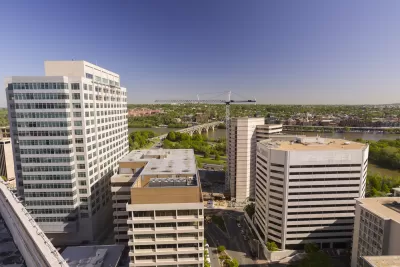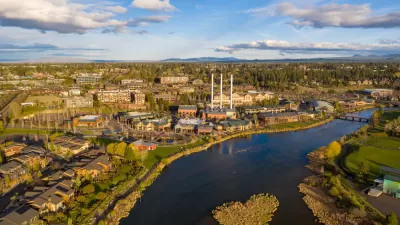Arlington County, Virginia has begun a process to reduce parking requirements for large residential developments near transit stations.

The amount of parking required near WMATA stations in Arlington, Virginia could soon drop, reports Andrew Dupuy, in "a move that reflects a growing understanding of how excess parking promotes urban sprawl and traffic congestion and drives up housing prices."
The Residential Parking Working Group has been working at the requet of the Arlington County manager to examine parking ratios for multi-family buildings built under special exemptions along certain corridors in Arlington County.
"Key recommendations [pdf] from the working group, which county officials say carry significant weight, include greatly reduced minimum parking requirements (MPRs) based on proximity to Metro, as well as reduced parking requirements in affordable housing units and for buildings where bike parking spaces, Capital Bikeshare stations, and car-sharing parking spaces are provided," writes Dupuy.
The article includes more detail on the recommendations, with breaks its reduced parking minimums into two tiers based on the size of the development and the proximity of the development to a WMATA station. Dupuy concludes the article by endorsing the recommendations for their benefit to affordability and walkability in Arlington County.
FULL STORY: Arlington will likely require less parking near Metro stations

Planetizen Federal Action Tracker
A weekly monitor of how Trump’s orders and actions are impacting planners and planning in America.

Restaurant Patios Were a Pandemic Win — Why Were They so Hard to Keep?
Social distancing requirements and changes in travel patterns prompted cities to pilot new uses for street and sidewalk space. Then it got complicated.

Map: Where Senate Republicans Want to Sell Your Public Lands
For public land advocates, the Senate Republicans’ proposal to sell millions of acres of public land in the West is “the biggest fight of their careers.”

Maui's Vacation Rental Debate Turns Ugly
Verbal attacks, misinformation campaigns and fistfights plague a high-stakes debate to convert thousands of vacation rentals into long-term housing.

San Francisco Suspends Traffic Calming Amidst Record Deaths
Citing “a challenging fiscal landscape,” the city will cease the program on the heels of 42 traffic deaths, including 24 pedestrians.

California Homeless Arrests, Citations Spike After Ruling
An investigation reveals that anti-homeless actions increased up to 500% after Grants Pass v. Johnson — even in cities claiming no policy change.
Urban Design for Planners 1: Software Tools
This six-course series explores essential urban design concepts using open source software and equips planners with the tools they need to participate fully in the urban design process.
Planning for Universal Design
Learn the tools for implementing Universal Design in planning regulations.
Heyer Gruel & Associates PA
JM Goldson LLC
Custer County Colorado
City of Camden Redevelopment Agency
City of Astoria
Transportation Research & Education Center (TREC) at Portland State University
Camden Redevelopment Agency
City of Claremont
Municipality of Princeton (NJ)





























